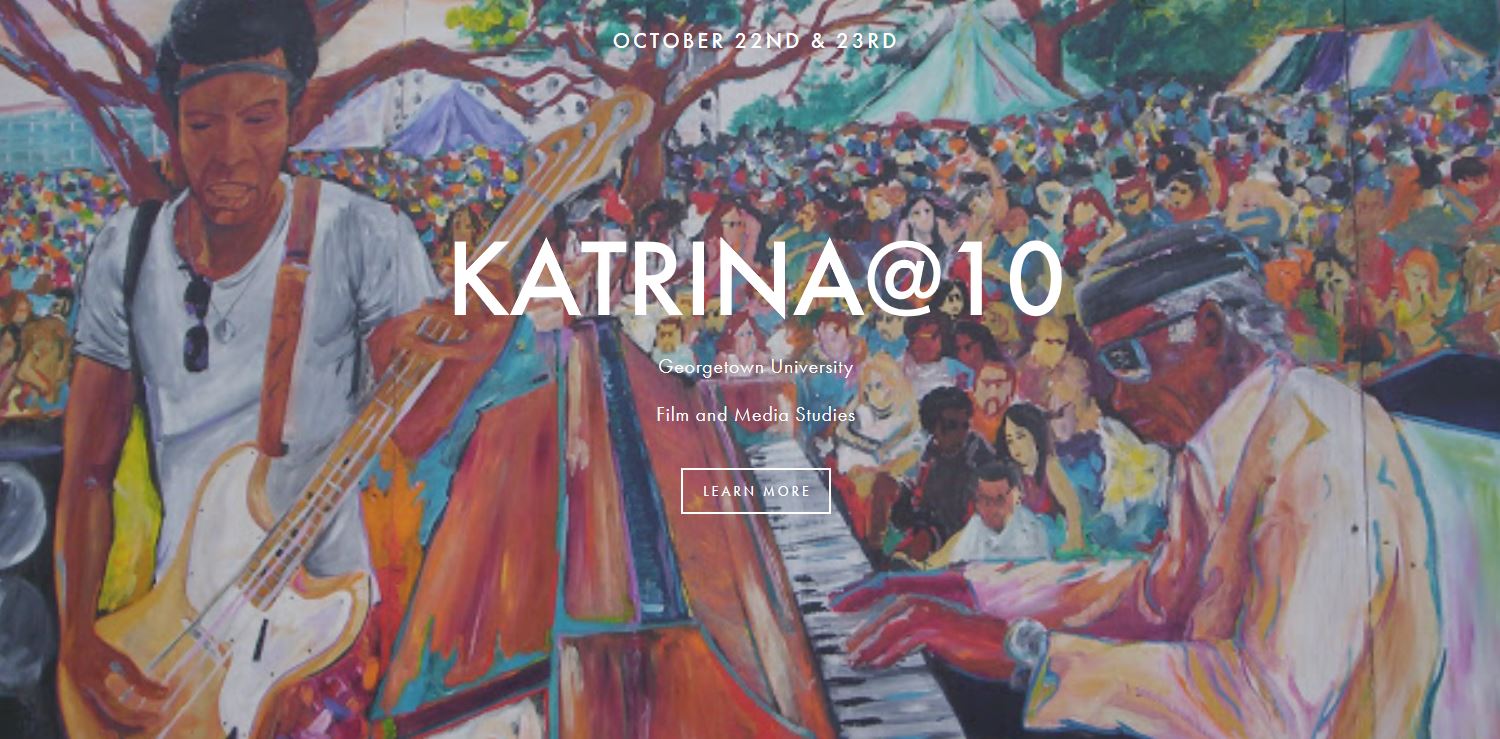On Oct. 22 and 23, the Film and Media Studies Program hosted the Katrina@10 symposium, a collection of events reflecting on the role of Hurricane Katrina in history and media ten years since the storm. The symposium included a film screening, three panel discussions, and a musical guest performance, with many of these events focusing on perspectives that the mainstream media did not convey in 2005.
Bernard Cook, director of the Film and Media Studies Program, began organizing the symposium over a year ago in response to his new book focusing on the role of media in Katrina. In addition to being involved with events in New Orleans for the tenth anniversary of the storm, he hoped to carry the focus to Georgetown as well. After receiving a grant from the Reflective Engagement Initiative, a university effort designed to support “academic research that aims to contribute in an important way to some major public issue”, according to the university’s website, he recruited Georgetown faculty including Professors Jo Ann Moran Cruz and Adam Rothman of the Department of History, as well as Randall Amster, director of the program on Justice and Peace, to contribute to the symposium.
Cook discussed the purpose of the symposium of recovering, reconsidering, and re-engaging with the events of Katrina. “Recover in the sense that I don’t think everyone at Georgetown even knows much about the particulars of what happened, so it’s very important for us to get everybody to know, to connect to the events and their consequences,” he said. “The reconsideration is, that’s what we do in the academy, in universities, we invest ourselves in the process of trying to understand and explicate. And then the re-engagement is around justice, and these issues demand I think from us a Georgetown response, and that response is not just one time, it’s ongoing.”
Professor Moran Cruz delivered the opening remarks on Friday morning. Drawing on her experience as Dean at Loyola University in New Orleans from 2008 to 2012, she provided an historical framework for understanding the events surrounding Katrina, including the police order to shoot looters on sight, the censuring of universities who were forced to fire faculty and cancel programs, and the later demographic change of the city in the rebuilding period, when a distinctly younger population emerged.
She also addressed how the media only delivered a limited depiction of the events. “Because Americans saw only snapshots of what was occurring in New Orleans and rarely saw a bird’s eye view, most people do not know that the area covered as a result of the broken levees and the inrush of water from two huge lakes was seven times the size of Manhattan,” she said.
The film screening of Trouble the Water Thursday night was an opportunity to fill this understanding not found in the media.
Lesya Yarema (SFS ’19) said she attended the film screening to learn about the storm on a deeper level. “They always say how the news media [showed bias towards] that event completely, so I [wanted to know] what was the real story,” she said.
Lina Zdruli, a master’s student in the SFS, discussed her motivation to attend the screening. “I’m from Europe, so I wasn’t even in the U.S. when we saw the tragedy on TV,” she said. “I was interested in seeing the perspective through [the film] how it was on the American side, because I only saw it through the screen of media so I couldn’t see it directly,”
This discussion of the media was furthered in the Media and Memory panel moderated by Cook. The panelists were documentarians who, in addition to detailing their filmmaking and reporting processes, discussed the impact of the storm on racial and ethnic groups in New Orleans. One of the documentaries, Faubourg Treme, for example, originally centered on the early black civil rights movement in New Orleans before the storm, and this history later became one layer of storytelling in the final film, according to filmmaker Dawn Logsdon. Luisa Dantas, creator of the film and digital multimedia project Land of Opportunity, discussed the large community of undocumented Latino workers who came following the storm in the rebuilding process, but noted that their efforts were not covered by the mainstream media.
The symposium followed with a Cultural History panel, a musical performance by Donald Harrison Jr., and a Justice and Action panel, which discussed the lessons learned by Katrina and the storm’s continued legacy in future justice movements. Panelist Jordan Flaherty said, “Without Katrina, there would not have been a Black Lives Matter movement,” quoting Alicia Garza, a founder of the movement. “I think the way that the organizing has happened in New Orleans has a lot of parallels to the organizing moment that we’re seeing now, this occupy political moment,” he said.
Cook hopes the Film and Media Studies Program will hold more events in the format of Katrina@10 going forward to explore the media’s impact throughout history.
“The intersection of media and social justice is crucial to the program, the intersection of media and history and the past is crucial to the program, documentary is a big thread of the program,” he said. “I think we need to recover from this one for a little bit before we worry about the next one, but yes [we] definitely [hope to hold more such events].”






